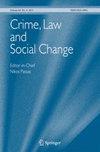条约批准后国家立法通过国际野生动物法
IF 1
4区 社会学
Q3 CRIMINOLOGY & PENOLOGY
引用次数: 0
摘要
自20世纪70年代以来,世界上出现了大量支持保护野生动物的国际条约。这些条约共同构成了国际野生动物法(IWL),其有效性取决于个别国家的国家执行情况,而不是它们的数量。从立法行动到资源分配,再到个人行为改变,各国都在实施内劳。法律执行不力会促进甚至导致野生动物犯罪。因此,研究各国如何落实其从IWL中获得的承诺,对于了解野生动物条约的效力(或缺乏效力)非常重要。本文的主要目的是通过以挪威为例,研究各国将国际野生动物承诺内部化为国家法律的动态。因此,本文探讨了挪威在批准《濒危野生动植物种国际贸易公约》(CITES)和《欧洲野生动物和自然栖息地保护公约》(伯尔尼公约)后采取国内法律行动的社会动态。这项研究是基于记录挪威立法过程的历史数据,这些数据来自于该国环境冲突的公约和历史记录。本文运用了查布利斯关于冲突的法律社会学视角来解读材料。虽然许多全球化学者认为全球化剥夺了国家的立法主权,但本文认为,挪威的野生动物政策主要依赖于国家力量之间的冲突,而不是挪威向国际社会让出立法权。换句话说,经济增长和生态系统保护之间的紧张关系决定了挪威如何履行IWL承诺。本文对环境制度有效性和条约对国内影响的文献有所贡献。本文章由计算机程序翻译,如有差异,请以英文原文为准。
National legislative adoption of international wildlife law after treaty ratification
Abstract Since the 1970s, the world has witnessed a proliferation of international treaties championing the protection of wildlife. The effectiveness of those treaties, which together comprise international wildlife law (IWL), depends on their national implementation by individual states rather than on their number. National implementation of IWL ranges from legislative action, to resource allocation, to individual behavioural change. Inadequate IWL implementation can facilitate and even lead to wildlife crime. Therefore, examining how countries operationalise their commitments derived from IWL is important to understand the efficacy (or lack thereof) of wildlife treaties. The main goal of this article is to investigate the dynamics by which nations internalise international wildlife commitments into state law, by using Norway as a case study. The article thus explores the social dynamics that shaped the domestic legal action that Norway undertook after its ratification of the Convention on International Trade in Endangered Species of Wild Fauna and Flora (CITES) and the Convention on the Conservation of European Wildlife and Natural Habitats (Bern Convention). The study is based on historical data documenting Norway’s legislative processes derived from the conventions and historical records of the country’s environmental conflicts. It applies Chambliss’s sociology of law perspective on conflict to interpret the material. While many globalisation scholars hold that globalisation stripped states of legislative sovereignty, this article argues that Norway’s wildlife policy is mostly dependent on clashes between national forces, rather than Norway conceding legislative powers to the international community. In other words, the tension between economic growth and ecosystem conservation determines how Norway implements IWL commitments. This article contributes to the literature on environmental regime effectiveness and the domestic impact of treaties.
求助全文
通过发布文献求助,成功后即可免费获取论文全文。
去求助
来源期刊

Crime Law and Social Change
Multiple-
CiteScore
2.50
自引率
0.00%
发文量
53
期刊介绍:
Covers crime and deviance at the global, national, regional and local level, worldwideHas a special focus on financial crime, corruption, terrorism and organizational crimeWelcomes criminological research in the areas of human rights, comparative and international criminal law and criminal justice Crime, Law and Social Change publishes peer reviewed, original research articles addressing crime and the political economy of crime, whether at the global, national, regional or local levels, anywhere in the world. The Journal often presents work on financial crime, corruption, organized criminal groups, criminal enterprises and illegal markets, state crime, terrorism and security issues, cybercrime, cross-border crime and environmental crime. In addition, Crime, Law and Social Change welcomes criminological research in the areas of human rights, comparative and international criminal justice, compensation and justice for serious crime victims, international criminal law and cooperation. Finally, the Journal publishes multi-disciplinary criminological research focusing on gender, age, racial and ethnic equality issues.
 求助内容:
求助内容: 应助结果提醒方式:
应助结果提醒方式:


